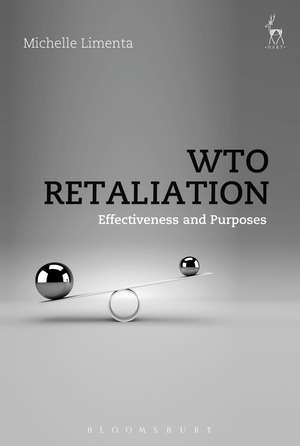WTO Retaliation: Effectiveness and Purposes
Autor Michelle Limentaen Limba Engleză Hardback – 22 feb 2017
| Toate formatele și edițiile | Preț | Express |
|---|---|---|
| Paperback (1) | 236.27 lei 6-8 săpt. | |
| Bloomsbury Publishing – 24 iul 2019 | 236.27 lei 6-8 săpt. | |
| Hardback (1) | 509.52 lei 6-8 săpt. | |
| Bloomsbury Publishing – 22 feb 2017 | 509.52 lei 6-8 săpt. |
Preț: 509.52 lei
Preț vechi: 730.70 lei
-30% Nou
Puncte Express: 764
Preț estimativ în valută:
97.51€ • 105.88$ • 81.91£
97.51€ • 105.88$ • 81.91£
Carte tipărită la comandă
Livrare economică 22 aprilie-06 mai
Preluare comenzi: 021 569.72.76
Specificații
ISBN-13: 9781509900008
ISBN-10: 1509900004
Pagini: 208
Dimensiuni: 156 x 234 x 2 mm
Greutate: 0.45 kg
Editura: Bloomsbury Publishing
Colecția Hart Publishing
Locul publicării:London, United Kingdom
ISBN-10: 1509900004
Pagini: 208
Dimensiuni: 156 x 234 x 2 mm
Greutate: 0.45 kg
Editura: Bloomsbury Publishing
Colecția Hart Publishing
Locul publicării:London, United Kingdom
Caracteristici
The author analyses the remedies rules from the key perspectives of public international law and law and economics.
Notă biografică
Michelle Limenta is a Senior Lecture and Director of the Center for International Trade and Investment at Universitas Pelita Harapan, Indonesia.
Cuprins
1. Overview I. Introduction to WTO Dispute Settlement: The Best Vote of Confidence for the Multilateral Trading System II. Problems Presented: Retaliation, a Flaw in the Successful System? III. WTO Law in Relation to Other Legal Systems IV. The Objective and Plan of the Book 2. Retaliation in the Multilateral Trading System I. Temporary Remedies in the DSU II. Law to Retaliate Under GATT and WTO Dispute Settlement III. Retaliation in Regional Trade Agreements 3. Shortcomings of WTO Retaliation and Reform Proposals I. The Shortcomings and Problems Inherent in WTO Retaliation II. Proposals to Enhance WTO Retaliation and the Criticisms 4. Purposed-based Approach in Evaluating Effectiveness I. Compliance, Implementation, Effectiveness and Purpose-based Approach II. Debates Regarding the Purpose of Retaliation 5. Legal Quests in Searching for the Purposes of RetaliationI. First Quest: Reference to Remedies Under the ILC Draft Articles on State Responsibility II. Second Quest: Reference to Contract Remedies from Law and Economics Perspective III. Third Quest: Article 22.6 Arbitrators' Statements With Regard to the Purpose of Retaliation IV. Fourth Quest: Interpretation of Article 22 of the DSU in Accordance with the Customary Rules of Interpretation to Clarify the Purposes of WTO Retaliation 6. Retaliation to Induce an Amicable Settlement as Another Competing Purpose and the Effectiveness of WTO Retaliation I. Amicable Settlements in the Multilateral Trading System II. The Question About the Effectiveness of WTO Retaliation III. A Way Forward 7. Concluding Remarks I. Summary of the Book II. Final Observations
















